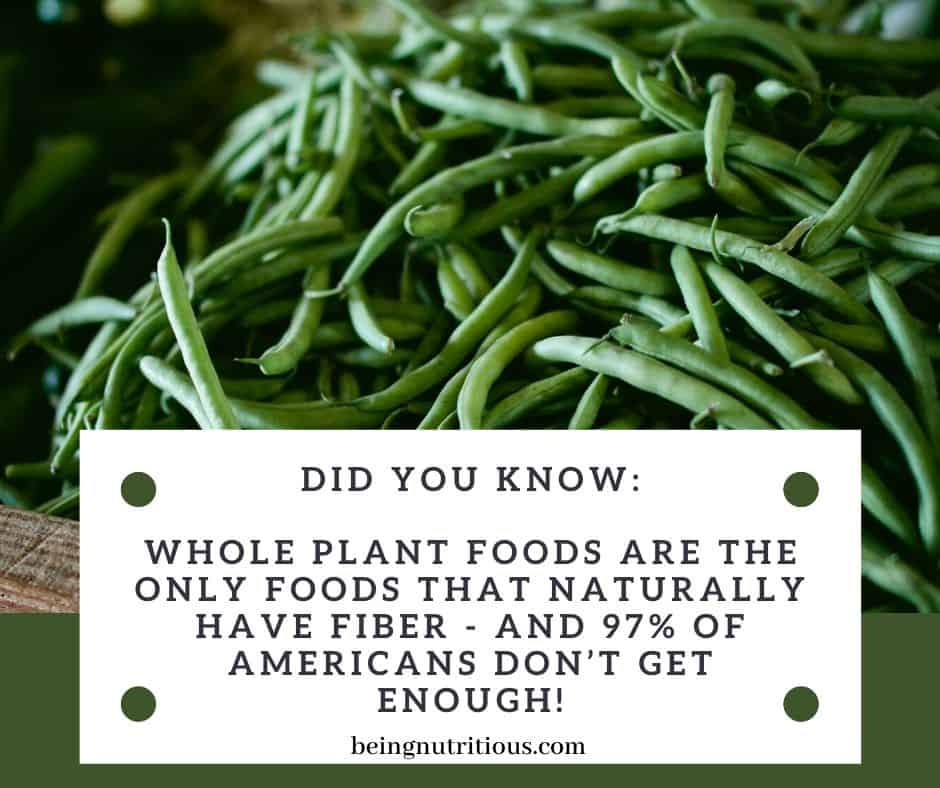You’ve heard that fiber is good for you, but what does it actually do? And what specifically does fiber do for your heart?
What is fiber?
When we talk about fiber in our food, we mean dietary fiber. Dietary fiber is a naturally occurring carbohydrate in plants that, while vital to our health, we are mostly unable to digest. Resistant starch, pectin, lignans, and cellulose are just a few types of dietary fiber.

Fiber, Constipation, and Heart Disease
Most people know about fiber’s ability to keep us regular. But it’s an important one! Constipation is a leading cause of hospitalization, and a potential contributor to many other GI issues. And more recently, constipation has been linked with cardiovascular disease. People who move their bowels less than once every three days have a significantly higher risk of dying from cardiovascular disease; especially stroke. The likeliest explanation for this link is that straining too hard can raise blood pressure, and trigger events like congestive heart failure, arrhythmias, acute coronary disease, and aortic dissection (1). Other explanations include changes in gut bacteria, and using medications that may increase the risk of both constipation and heart disease at the same time.
No matter the link, consistently consuming enough fiber goes a long way to keep everything running smoothly and coming out on time! It does that by absorbing water in your intestinal tract, and forming a softer, bulkier, and easier-to-pass stool.
Fiber and Cholesterol
There is a certain kind of fiber, called soluble fiber. Soluble fiber dissolves in water, and forms a kind of gel in the digestive tract. It seems to have an affinity for cholesterol; specifically LDL (the “bad” cholesterol). In the digestive tract it traps excess cholesterol and eliminates it from the body (2, 3, 4, 5, 9). Soluble fiber also helps lower blood sugar levels the same way - useful for both diabetes and heart disease management!
Dry beans, oats, barley, strawberries, apples, and potatoes are just a few foods high in soluble fiber.
Fiber and Blood Pressure
While fiber was initially researched for its cholesterol lowering properties, it was also found to potentially have blood pressure lowering effects. In particular, beta-glucan, which is a fiber found in oats and barley, seems to have a profound effect on both systolic (the top number) and diastolic (the bottom number) readings (6, 7, 8).
While more studies need to be done in this area to determine the mechanism whereby beta-glucan may lower blood pressure, there are certainly no unwanted side effects that may occur by including more oats and/or barley in the diet.
Fiber and Gut Health
Another, more recently discovered benefit to fiber, is that it provides food for the good bacteria in our guts. While we can't digest these so-called prebiotics, those beneficial bugs can, which in turn helps keep us healthy! Chronically consuming too little fiber can greatly diminish or eliminate, sometimes irreversibly, some beneficial bacteria species (10).
Moreover, other types of bacteria are present in the gut that feed off of less healthy things, like highly refined and processed foods, tend to produce compounds that cause inflammation in the body that can lead to heart disease and other chronic diseases. This is a newly emerging area (and the topic for another article!), so stay tuned for much more!

How Much Fiber Should I Eat?
According to the Institute of Medicine, women under 50 should consume at least 25 grams a day, and men under 50 should consume at least 38 grams a day. Women over 50 should consume at least 21 grams a day, and men over 50 should consume at least 30 grams a day. There is no upper limit (an amount above which has been found unsafe) for fiber. So fiber away!
What Are the Signs of Inadequate Fiber Intake?
Fiber is not considered an “essential nutrient” because there aren’t clinical signs of deficiency with below optimal intake, like there are with vitamins and minerals. However, as we talked about above, chronically low fiber intake can lead to constipation, as well as potentially leading to heart disease and other inflammatory conditions over time (11).
How Can I Eat More Fiber?
It’s important to increase fiber slowly, and as you increase the amount of fiber you eat, increase the amount of water you drink. Remember that fiber tends to absorb water, and staying properly hydrated is important for heart health, and overall health. Increasing fiber too quickly can lead to bloating and gas.
Fiber is naturally occurring only in plants, so making fruits, vegetables, whole grains, nuts, and seeds more of a priority can help you reach your fiber recommendations. Here are some additional tips to increase fiber intake:
- Eat fruit for dessert most days.
- Switch from white bread to 100% whole grain bread.
- Fill at least half of every plate with produce - mostly vegetables.
- Use dips made from fruits/vegetables, like hummus, guacamole, and salsa.
- Add nuts and seeds to cereal, oatmeal, and salads.
- Use brown rice instead of white.
- Use lentils or beans in pasta sauce instead of ground beef.
- Add mashed bananas, pumpkin purée, ground flax, or chia seeds to (some) baked goods instead of eggs.
- Top frozen pizzas with additional sliced or chopped veggies.
- Make at least one day a week “meatless” and include vegetable proteins like dry beans/peas, lentils, nuts/seeds, etc.
- Eat whole pieces of fruit instead of drinking fruit juice.
- Try whole grain pasta instead of white pasta.
- Make a big vegetable or fruit salad at the beginning of the week, and eat from it all week to cut down on prep time.

What About Fiber Supplements?
I don’t usually recommend fiber supplements. There are many different kinds of fiber, so it’s important to include a variety of fiber sources from lots of different plants. Fiber supplements usually have only one or two types. Plus, foods that are high in fiber have many other nutrients and benefits that a fiber supplement doesn’t have. A small number of people may benefit from a fiber supplement. If you’re not sure if you’re one of them, be sure to ask your doctor or dietitian!

Leave a Reply